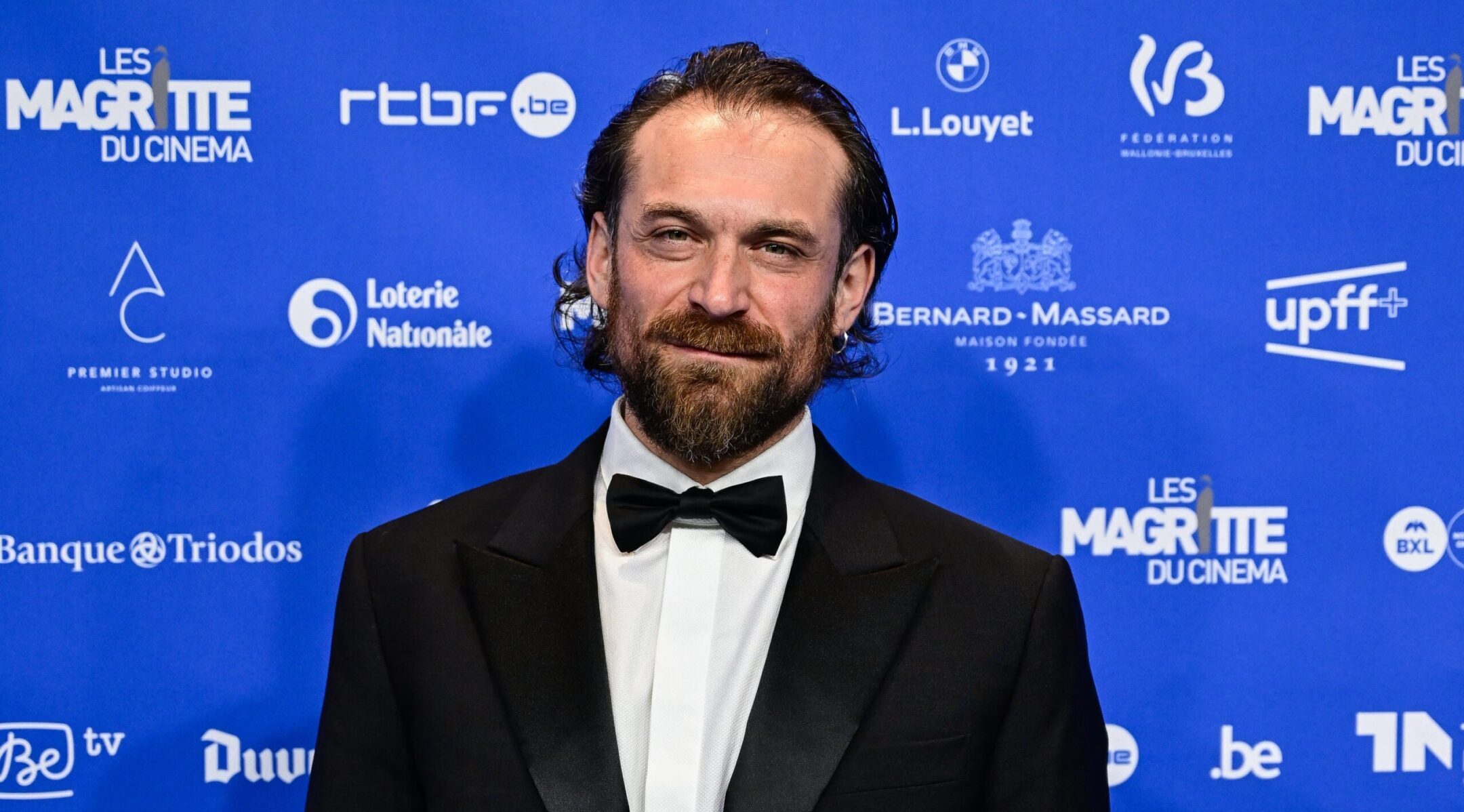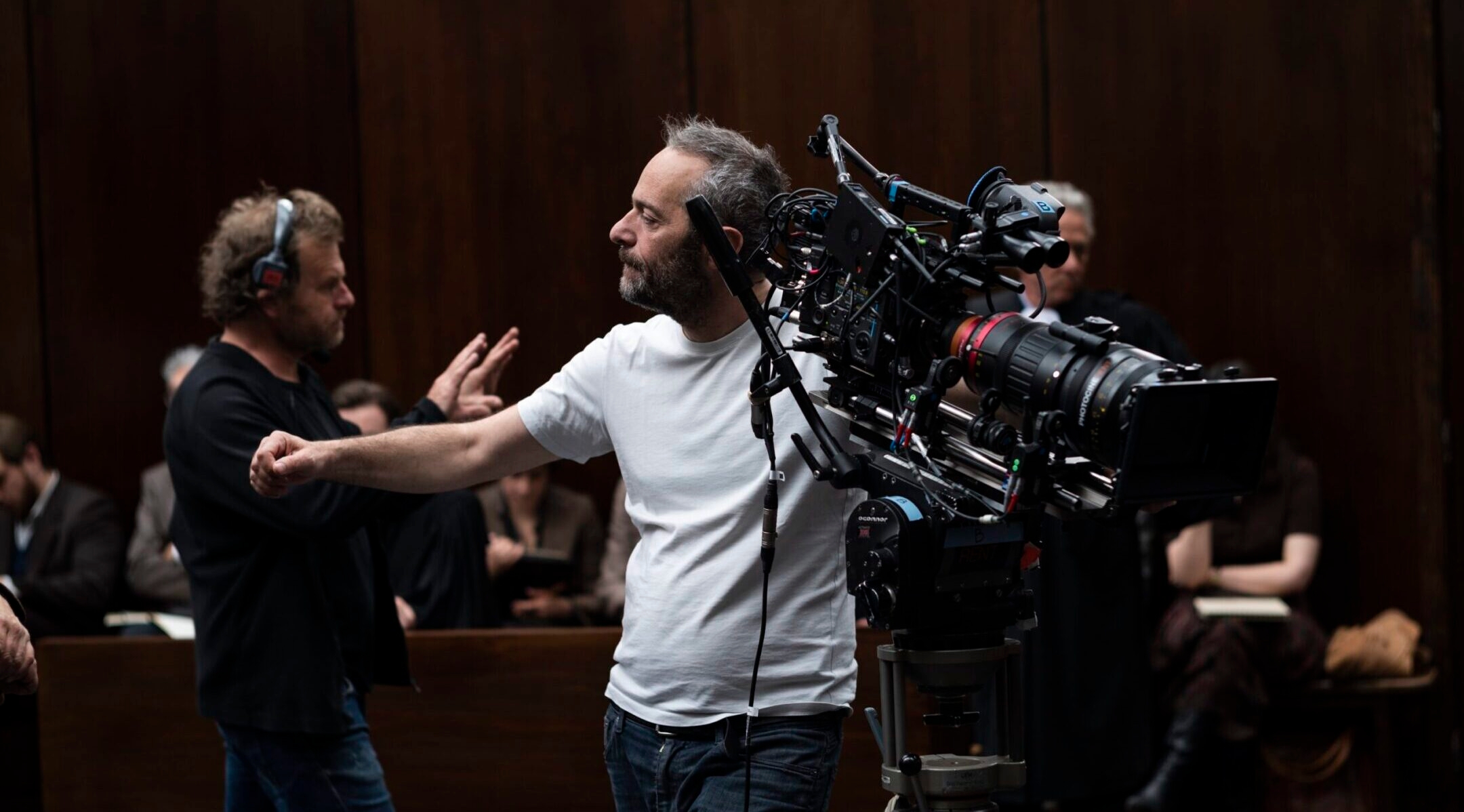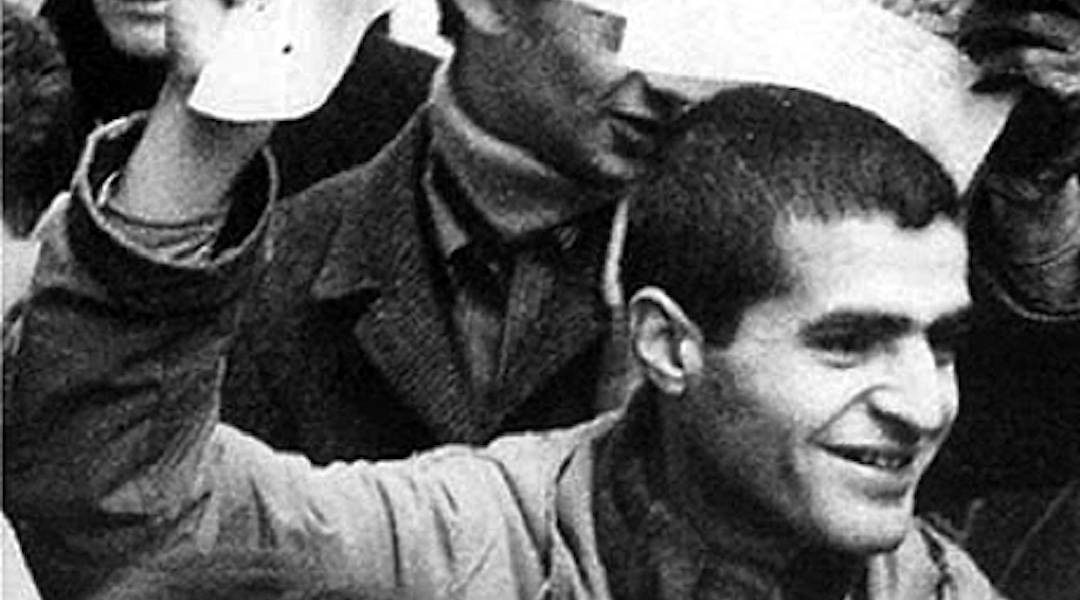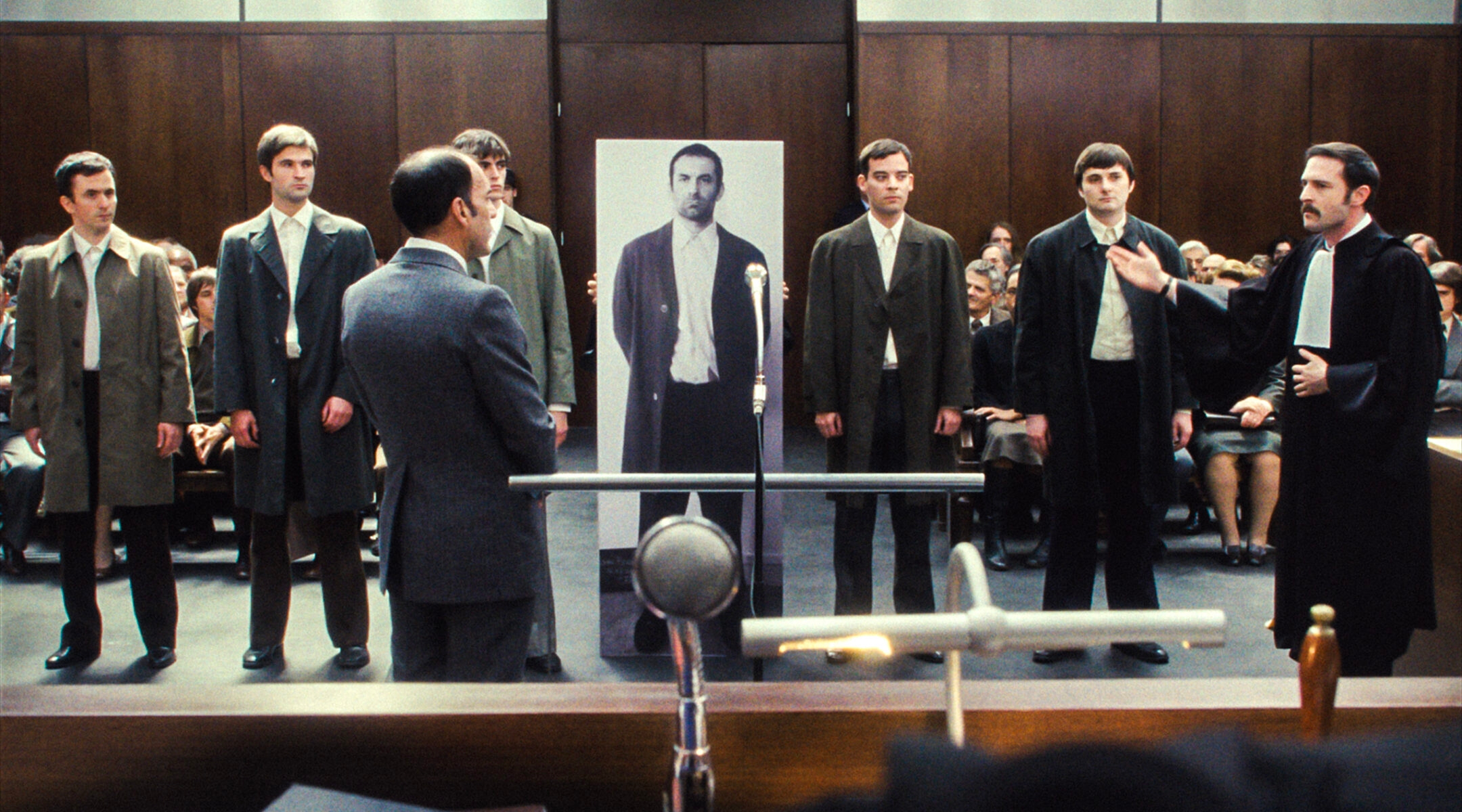Pierre Goldman was a figure of legend in 1970s France — a firebrand leftist intellectual, a criminal, a child of the Holocaust, and a man accused of murders that remain shrouded in mystery to this day.
“The Goldman Case,” a French courtroom drama that homes in on Goldman’s 1976 retrial for murder, has thrust him back into the spotlight. The film premiered at the Cannes Film Festival in 2023 and became a hit in France, where Jewish actor Arieh Worthalter won a César Award — the French equivalent of the Oscar — for his portrayal of Goldman.
The movie recently made its U.S. debut in New York City and Los Angeles and is now opening in theaters across the country, giving U.S. viewers a chance to steep themselves in a French Jewish mystery that echoes into the present.
Director Cédric Kahn was first drawn to Goldman by his 1975 memoir, “Dim Memories of a Polish Jew Born in France.” Goldman wrote the book in prison. He had been convicted of four armed robberies, including a 1969 pharmacy hold-up that ended in the deaths of two women, and sentenced to life imprisonment. Goldman confessed to the burglaries but vehemently denied killing the pharmacists.
The book traced Goldman’s life of violence and self-torment to the burdens of his past. He was born in June 1944 to Polish Jewish parents who took part in the resistance to the Nazi occupation of France. At the end of World War II, his parents separated and his mother planned to take him back to Poland. But his father kidnapped the baby to raise him in France — and to keep him away from the country where 3 million Jews were killed.
Goldman grew up under the shadow of the Holocaust, filled with anger, guilt and a drive to emulate the revolutionary heroism of his parents. (“I wanted to be like them, know that atmosphere of revolt, that pride and honor,” the character Goldman says in the film. “I wanted to be a Jewish warrior too, to free myself of the stigma of being a Jew.”)
The Jewish Telegraphic Agency is screening “The Goldman Case” online on Dec. 3. Register for tickets and a conversation with its Oscar-winning star Arthur Harari.
That desire took him from a communist student union to Cuba, where his help was rejected by communist guerrillas, and to Venezuela, where he joined a guerrilla group too late to be part of a revolution. His idealism curdled into theft, including a major bank robbery in Venezuela. Back in Paris, he quickly squandered the cash on drink, expensive restaurants and crisp shirts. (“I sweat a lot and hate doing laundry,” the character tells the judge.)
While readily admitting his failures, Goldman insisted that he would never kill innocent people.
“I think when he’s accused of murder, it’s a stain on his father, his mother, on himself,” Worthalter said in an interview. “He’s as much driven morally by fighting for his innocence as fighting for that of his parents. For me, there was really this correlation between the accusation against him and against the Goldman name.”

Actor Arieh Worthalter, who portrays Pierre Goldman in “The Goldman Case,” arrives at the Magritte du Cinema film awards ceremony in Brussels, Belgium, March 9, 2024. (Laurie Dieffembacq/Belga Mag via AFP via Getty Images)
Goldman’s memoir was lauded by French celebrities and members of the intelligentsia, such as actress Simone Signoret and philosopher Jean-Paul Sartre. Those plaudits, together with new evidence and inconsistencies from his first trial, led to the high-profile retrial that is recreated in “The Goldman Case.”
Kahn and screenwriter Nathalie Herzberg, themselves French Jews whose parents were “children of the Shoah,” reconstructed the trial through newspaper articles and interviews with Goldman’s lawyers. (France prohibits filming or photographing trials.) They took some liberties, such as combining elements of the two trials, but also reproduced entire speeches word for word. The movie relies heavily on those speeches — it takes place almost entirely in the courtroom, forgoing music or flashbacks, to put the viewer in the seat of a juror.
“The Goldman Case” is not just about one man’s struggle to forge his destiny from the rubble of history. Goldman’s trial exposed deep fault lines in French society of the 1970s. The student revolts of 1968 were over and radical leftist movements were gasping their last breath — but many social questions remained wide open, including inequality, racial bias in the police and justice system, and polarization between the liberal Parisian intelligentsia and the more conservative population of France’s small towns.
All of these issues are laid bare in the trial. Goldman, who always lived among Black people, mainly from the West Indies — including his wife, Guadeloupe-born Christiane Succab-Goldman (played by Chloé Lecerf) — speaks about the experience of Jewish and Black people as a unified struggle. He declares that the French police are racist, going so far as to accuse them of a “conspiracy,” which sounds far-fetched until one Black witness after another testifies about police officers beating or intimidating them into incriminating Goldman.
Meanwhile, the prosecutor Henri-René Garaud (Nicolas Briançon) invokes a deep suspicion of liberal “elites” and outsiders that will sound familiar to audiences today, particularly those who have heard politicians promise to return countries to their true patriots. “I’ll speak in the name of France, the true France, the one of workers and honest folk, the one in whose name justice is done,” the character Garaud says in his closing argument.

Director Cedric Kahn on the set of “The Goldman Case.” (Courtesy of Menemsha Films/Moonshaker)
Kahn said echoes of current-day politics became clear to him in the process of making the film.
“I didn’t think that I was going to be making a film that was a sociological portrait of France, a France that’s always been there,” he said. “There’s always been, on the one hand, this kind of native France — French people who claim that they belong to the land. But we also know that France is a land of immigration, and there’s always been conflict between the two.”
A year after the film was released in France, the country held parliamentary elections. The election’s first round was dominated by the far-right, anti-immigration National Rally party, whose founders include convicted Holocaust denier Jean-Marie Le Pen and former Nazi Waffen-SS commander Pierre Bousequet. The second round swung to favor a left-wing coalition, encompassing the far-left France Unbowed party — which has recently been accused of dismissing the threat of antisemitism in France.
This fracturing between far-right and far-left political movements bears a resemblance to the microcosm captured in the courtroom of “The Goldman Case,” said Kahn — as does the fraught debate over how to speak about antisemitism, racism and the history of Jews and immigrants in France.
Goldman has a foil in the film: his attorney Georges Kiejamn (played by Arthur Harari, who also co-wrote the Oscar-winning courtroom drama “Anatomy of a Fall”). Kiejman, too, is a Polish Jew who was born in France and grew up poor. But where Goldman is a radical agitator who passionately proclaims his identity, Kiejman is a pragmatic centrist who says his Jewishness is “not relevant,” presenting a careful and calculated defense based on introducing doubt.
While Goldman descended into a life of crime, Kiejman was climbing his way to establishment success, eventually becoming a minister of justice after the trial. They observe each other with suspicion, rivalry and sometimes contempt: Before the trial even begins, Goldman attempts to fire Kiejman in a letter calling him an “armchair Jew,” presumably connoting a kind of Jewish passivity. (The real letter was provided to Kahn by Goldman’s other lawyer, André Chouraqui.)
The character Kiejman responds, “How dare he? Who does he think I am? I had to work hard to get here… He’s the armchair Jew with his bestseller and leftist groupies.”
“I think that the antagonism between Goldman and Kiejman tells us a great deal about being Jewish, and not only in France — I think it’s quite universal,” said Kahn. “Pierre Goldman believes he carries within himself a tragedy that he can’t liberate himself from, whereas Kiejman wants to emancipate himself from that tragedy by integrating.”
However unwillingly, these two Jews mold each other. Kiejman takes a meticulous approach to Goldman’s defense, ultimately clearing him of the murder charge. And in Kiejman’s closing speech, after watching Goldman through the whole trial, he finally speaks of their shared history: “The tragedy of Eastern Europe’s Jews.”
“We both belong to the same community, that of Polish Jews, that has integrated [into] French society while retaining of its origin the anxieties and deep wounds,” says Kiejman. “I ask you, if possible, to please forget the effect his personality has on you, and not to judge him on his appearance. And I say frankly, we never recover from our childhood.”

“The Goldman Case” focuses on the 1976 retrial of revolutionary leftist Pierre Goldman, above, who had previously been convicted of killing two pharmacists in the course of an armed robbery. (Wikipedia)
After his murder conviction was overturned and after serving six years in prison, Goldman received an early release in 1976. Three years later, under circumstances that are still unclear, he was shot and killed in Paris. Over 10,000 people attended the funeral. His killers were never found, and the double murder of the pharmacists was never solved.
Goldman’s murder became part of his legend, according to Kahn. He wanted his film to preserve the question marks that followed Goldman. While Worthalter believed in Goldman’s innocence — he told JTA that he had to, in order to play the part — Kahn declined to take a stand.
“I find this story interesting because we don’t know,” he said. “There’s a lot of mystery around this story.”
JTA has documented Jewish history in real-time for over a century. Keep our journalism strong by joining us in supporting independent, award-winning reporting.






